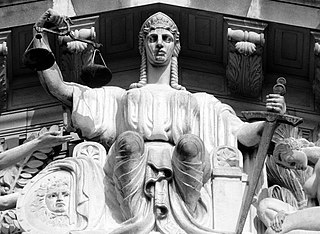Ethical codes are adopted by organizations to assist members in understanding the difference between right and wrong and in applying that understanding to their decisions. An ethical code generally implies documents at three levels: codes of business ethics, codes of conduct for employees, and codes of professional practice.
A conflict of interest (COI) is a situation in which a person or organization is involved in multiple interests, financial or otherwise, and serving one interest could involve working against another. Typically, this relates to situations in which the personal interest of an individual or organization might adversely affect a duty owed to make decisions for the benefit of a third party.
Confidentiality involves a set of rules or a promise usually executed through confidentiality agreements that limits the access to or places restrictions on the distribution of certain types of information.
Legal psychology is a field focused on the application of psychological principles within the legal system and its interactions with individuals. Professionals in this area are involved in understanding, assessing, and questioning suspects, evaluating potential jurors, investigating crimes and crime scenes, conducting forensic investigations, and handling other legal contexts. The term "legal psychology" distinguishes this practical branch of psychology from the more theory-oriented field of clinical psychology.
The Potter Box is a model for making ethical decisions, developed by Ralph B. Potter, Jr., professor of social ethics emeritus at Harvard Divinity School. It is commonly used by communication ethics scholars. According to this model, moral thinking should be a systematic process and how we come to decisions must be based in some reasoning.
Journalistic ethics and standards comprise principles of ethics and good practice applicable to journalists. This subset of media ethics is known as journalism's professional "code of ethics" and the "canons of journalism". The basic codes and canons commonly appear in statements by professional journalism associations and individual print, broadcast, and online news organizations.
Professional responsibility is a set of duties within the concept of professional ethics for those who exercise a unique set of knowledge and skill as professionals.
Media ethics is the subdivision dealing with the specific ethical principles and standards of media, including broadcast media, film, theatre, the arts, print media and the internet. The field covers many varied and highly controversial topics, ranging from war journalism to Benetton ad campaigns.
Recusal is the legal process by which a judge, juror, or other adjudicator steps aside from participating in a case due to potential bias, conflict of interest, or appearance of impropriety. This practice is fundamental to ensuring fairness and impartiality in legal proceedings, preserving the integrity of the judiciary, and maintaining public confidence in the legal system. Historical and modern legal frameworks outline specific grounds for recusal, such as personal or financial conflicts of interest, prior involvement in a case, or demonstrated bias. Applicable statutes or canons of ethics may provide standards for recusal in a given proceeding or matter. Providing that the judge or decision-maker must be free from disabling conflicts of interest makes the fairness of the proceedings less likely to be questioned, and more likely that there is due process.
Engineering ethics is the field of system of moral principles that apply to the practice of engineering. The field examines and sets the obligations by engineers to society, to their clients, and to the profession. As a scholarly discipline, it is closely related to subjects such as the philosophy of science, the philosophy of engineering, and the ethics of technology.
Eleanor Swift,October 16, 1945 - September 20, 2023, was a professor at the University of California, Berkeley School of Law. She was best known for her work on the theory of evidence, and additionally taught civil procedure, the legal profession, and periodic seminars.
Accounting ethics is primarily a field of applied ethics and is part of business ethics and human ethics, the study of moral values and judgments as they apply to accountancy. It is an example of professional ethics. Accounting was introduced by Luca Pacioli, and later expanded by government groups, professional organizations, and independent companies. Ethics are taught in accounting courses at higher education institutions as well as by companies training accountants and auditors.
Ethics in the public sector is a broad topic that is usually considered a branch of political ethics. In the public sector, ethics addresses the fundamental premise of a public administrator's duty as a "steward" to the public. In other words, it is the moral justification and consideration for decisions and actions made during the completion of daily duties when working to provide the general services of government and nonprofit organizations. Ethics is defined as, among others, the entirety of rules of proper moral conduct corresponding to the ideology of a particular society or organization (Eduard). Public sector ethics is a broad topic because values and morals vary between cultures. Despite the differences in ethical values, there is a growing common ground of what is considered good conduct and correct conduct with ethics. Ethics are an accountability standard by which the public will scrutinize the work being conducted by the members of these organizations. The question of ethics emerges in the public sector on account of its subordinate character.

Bias is one of the grounds of judicial review in Singapore administrative law which a person can rely upon to challenge the judgment of a court or tribunal, or a public authority's action or decision. There are three forms of bias, namely, actual, imputed and apparent bias.

Deborah Lynn Rhode was an American jurist. She was the Ernest W. McFarland Professor of Law at Stanford Law School and the nation's most frequently cited scholar in legal ethics. From her early days at Yale Law School, her work revolved around questions of injustice in the practice of law and the challenges of identifying and redressing it. Rhode founded and led several research centers at Stanford devoted to these issues, including its Center on the Legal Profession, Center on Ethics and Program in Law and Social Entrepreneurship; she also led the Michelle R. Clayman Institute for Gender Research at Stanford. She coined the term "The 'No-Problem' Problem".
Behavioral ethics is a field of social scientific research that seeks to understand how individuals behave when confronted with ethical dilemmas. It refers to behavior that is judged within the context of social situations and compared to generally accepted behavioral norms.
Primary care ethics is the study of the everyday decisions that primary care clinicians make, such as: how long to spend with a particular patient, how to reconcile their own values and those of their patients, when and where to refer or investigate, how to respect confidentiality when dealing with patients, relatives and third parties. All these decisions involve values as well as facts and are therefore ethical issues. These issues may also involve other workers in primary healthcare, such as receptionists and managers.

Procedural impropriety in Singapore administrative law is one of the three broad categories of judicial review, the other two being illegality and irrationality. A public authority commits procedural impropriety if it fails to properly observe either statutory procedural requirements, or common law rules of natural justice and fairness.

Re Shankar Alan s/o Anant Kulkarni was a 2006 administrative law judgment in which the High Court of Singapore quashed a decision made by the Disciplinary Committee of the Law Society of Singapore against a lawyer, Alan Shankar s/o Anant Kulkarni. The Disciplinary Committee had found Shankar, who was a solicitor, guilty of grossly improper misconduct under the Legal Profession Act. Shankar applied to the High Court for judicial review on the ground that the Committee's ruling was affected by apparent bias.
The American Psychological Association (APA) Ethical Principles of Psychologists and Code of Conduct includes an introduction, preamble, a list of five aspirational principles and a list of ten enforceable standards that psychologists use to guide ethical decisions in practice, research, and education. The principles and standards are written, revised, and enforced by the APA. The code of conduct is applicable to psychologists in a variety of areas across a variety of contexts. In the event of a violation of the code of conduct, the APA may take action ranging from termination of the APA membership to the loss of licensure, depending on the violation. Other professional organizations and licensing boards may adopt and enforce the code.



